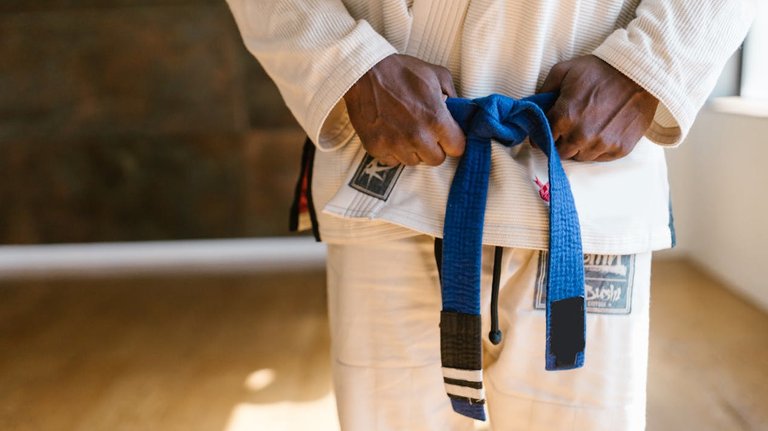Belt ranks in martial arts are a funny thing. In a perfect world, a belt rank is a good indicator of how much of the qualities that make up a martial artist are developed. These desired qualities vary from art to art, person to person, and style to style. But they can be summed up as fighting ability, character development, historical knowledge, theoretical knowledge, and physical fitness.

Photo by Artem Podrez: https://www.pexels.com/photo/healthy-man-person-art-6253306/
The development of so many things is a big ask from a given movement practice. And I disagree that a colored belt ranking system is the best way to track progress through those qualities. In fact, I believe that a modern martial artist should not use belt ranks at all to organize curriculum, track, or acknowledge progress. There are many problems with this system. Let’s discuss one.
If a person attains a given rank, and then stops training, is their rank invalidated? If so, how long of a break in training is necessary to invalidate their rank?
There are a lot of opinions on this matter. Recently I stumbled across a YouTube video where someone was discussing this very matter. While the creator of the video acknowledged that there are many variables at play and that it is a very individual thing, they did mention a few key items that they felt would lead to a rank being invalidated. Time away from training, knowledge loss, and muscle memory and reaction time loss. Let’s address each of these three things.
Regarding time away from training the claim made was that in as little as two weeks of not practicing you begin losing skill, physical capacity, and knowledge. Further, the claim was that after two months, you lose most of your skill in an area.
This is simply not the case. The truth is that depending on the individual’s time in training and many other factors, skill loss can happen faster or slower. In fact, it’s possible to overtrain a skill . Due to the lack of time for recovery and integration of the skill and knowledge, one can indeed become less skilled by training more. There’s also the concept of the “implementation dip”. When one experiences an implementation dip, their skill or efficiency in a task can decrease as new information is assimilated.
In other words, our skills and knowledge can wax and wane over a given time period whether we’re training consistently, overtraining, or undertraining. Clearly, time is not a good marker of skill regression.
But let’s get down to brass tacks. Knowledge and skill regression were pointed out in the YouTube video. This is really where the rubber meets the road. So, let’s do some thought experiments.

Photo by RDNE Stock project: https://www.pexels.com/photo/person-in-a-white-karate-uniform-with-a-blue-belt-8611964/
If a given martial artist is in a car accident and has a long recovery that involves hospital time, physical therapy, activity restrictions, and an ease back into full activity, does that person lose their belt rank? What if it takes them a year to get back into the dojo?
Of course not.
Now, let’s take the same time frame and a different situation. Someone falls on hard financial times and has to get a second job. They now don’t have the same time or energy for training. Maybe they don’t make it to the dojo for a year. Do they lose their rank?
What about many of the other myriad reasons one might experience a fluctuation in their available time, energy, or health for training? This is a normal part of life. Is it reasonable to invalidate one’s belt rank because of any of these issues?
Of course not.
There are many reasons why someone may experience a forced time out of training. And a given reason may or may not result in any real, meaningful loss of skill, knowledge, or physical capacity. So, to suggest that a given belt rank is invalidated due to time off of training is absurd.
I have heard of martial arts schools that utilize “probationary” ranks, especially for a first degree black belt. And I’ve heard of schools that will no longer recognize a person’s rank if they are out of training for a certain period. I believe that these policies are simply tools to keep a dojo’s income stable and are unrelated to how people learn, retain, and lose skill and knowledge. Skill and knowledge will naturally evolve over time, and neither are lost nearly as quickly as some folks believe.
Of course, the whole discussion becomes moot if we train in an environment where belt ranks aren’t even used. This kind of environment is ideal, and keeps the focus on the practice rather than on a hierarchical curriculum that doesn’t always serve the student well.
 Please vote for the Ecency Proposal.
Please vote for the Ecency Proposal.